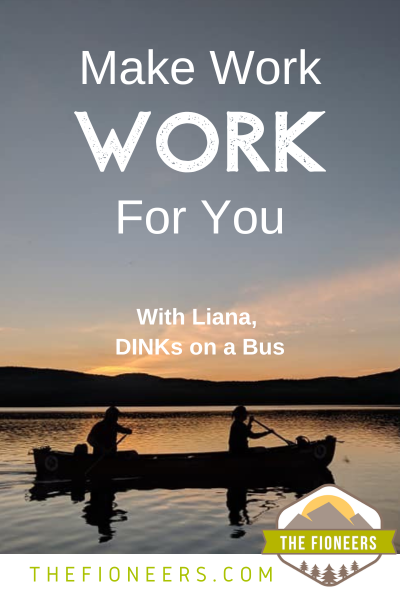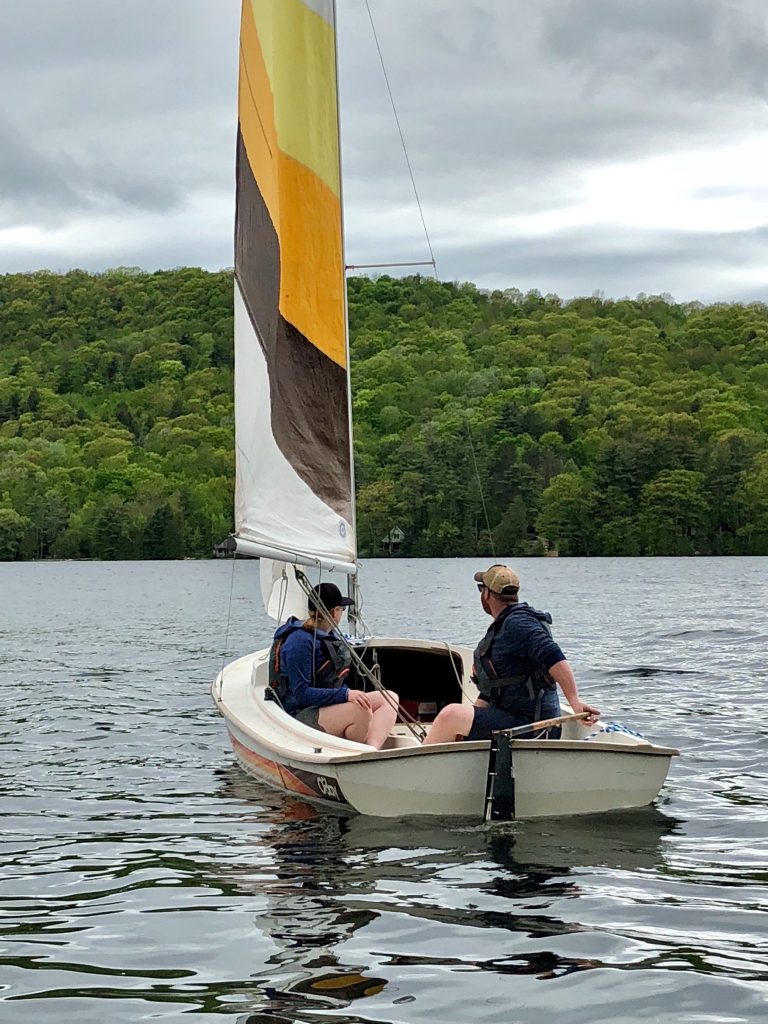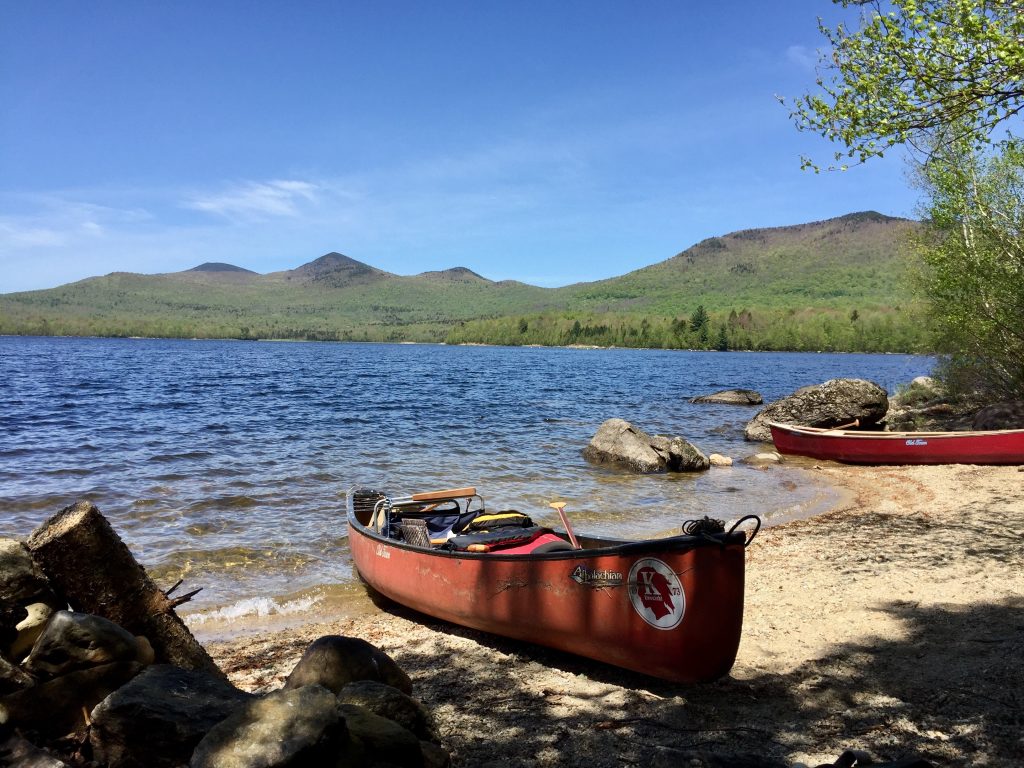

I’m excited to bring you a Slow FI Interview with Liana, the blogger behind DINKs on a Bus, whose Slow FI journey has focused on making work WORK for her.
To do this Liana has done a variety of things including:
- Quitting a highly prestigious job that wasn’t working for her
- Changing careers
- Deciding to stay in an individual contributor role rather than pursuing management
- Setting clear boundaries
Liana is a great example of the fact that you don’t have to become an entrepreneur to design your life. I’ve been so lucky to have a front-row seat to Liana’s progress since working with her as a client earlier this year.
Let’s get into the interview.
1. Tell me a little bit about you.
Hi everyone! My name is Liana, and I live in Vermont with my husband. We are a DINK (double income, no kids) household. We absolutely love spending time with kids (and finally have our first niece!), but we have chosen not to have children of our own. When we’re not working, we love camping, hiking, canoeing, and (more recently) playing pickleball.
I have my Ph.D. in Neuroscience, and I love that I have a job where I get to use my science background. Over time, I have learned that there’s so much more to my life than what I do to make money.
I have always been frugal and a saver. When I learned about financial independence, I loved the idea of being financially free. At the same time, the “retire early” part of the FIRE movement never really resonated with me. I never pictured myself not working.


I spent my early adulthood on the hamster wheel, chasing after the next big thing (the degree, the promotion, the raise, etc.). I thought I had “the dream” when I finally landed a professorship in Vermont, the place I most wanted to be in the world.
This is what I had been working toward since college. But, for many reasons, I realized that it wasn’t all it was cracked up to be. I loved teaching, but there were so many other factors that weighed on me, like…
- Being disrespected by older and male colleagues
- Being constantly asked to go above and beyond to help students outside normal working hours
- The pressures of academia to “publish or perish”.
Ultimately, I decided that it wasn’t worth it. There had to be another way I could live my life, make money, and stay in Vermont.
Around this time, I had knee surgery, and I used my medical leave to do some detective work. I got online to see what else was out there that I could do with my degree. I discovered freelance scientific writing and editing, and I started to do that work on the side.
After seeing that I could make this work (and since my work in academia wasn’t getting better), I decided to quit my professor job. As much as I enjoyed freelancing because of the time freedom, I was still young and worried about money and stability. So, when one of my freelance clients offered me a full-time job as an editor, I took it (even though it was a huge pay cut). I wanted stability, benefits, and a steady paycheck.
The pay cut was worth it. Even though I made less money, I also ended up working many fewer hours than I’d ever worked in my life. I could meet my editing quota for the day and turn my brain off when I wasn’t working. It was life-changing and one of the best decisions I’ve ever made.
By drastically reducing the time I spent working (and thinking about work), the more time I had to focus on myself. I realized that I had so many other passions outside of my job. And, I wanted to spend more time on these activities! I started to see that maybe I didn’t want the career I’d been chasing after all. Then, I started to think of a job as a way to make money to support the life I wanted.
Soon after this transition, I discovered Slow FI after hearing Jess on a podcast. I was completely hooked by this new idea, this alternative, in the FIRE movement. It resonated with the new direction I saw my life going, and I’ve been designing my life ever since.
2. You recently changed jobs, partially with an eye toward building a Slow(er) FI lifestyle in the long term. Can you tell us more about this?
When I left academia, not only did I take a big pay cut, but I also shifted my mindset. I no longer wanted my identity to be so tied to my work. Instead, I wanted my work to fund the lifestyle I wanted. Because of this, I decided to focus on increasing my salary in a new field.
I discovered the field of medical writing, an industry I already had all the credentials to make my way into. It took me a while to land a job in this field, but I’ve been able to work my way up the salary band ever since.
However, I quickly found myself inching back toward the feeling of being on the hamster wheel. I was good at my job, I had a lot of success, and I had great people skills. So, my peers and managers immediately encouraged me to climb the ladder and work my way up. At first, this seemed like a no-brainer.
Luckily, I took an internal leadership course and made some valuable self-discoveries. I learned what it would take to be a manager. I knew I could do it, but I didn’t want it. I enjoyed working as an individual contributor, and I was good at it. I also didn’t want the manager’s schedule with so many meetings and added responsibility.
Lastly, as I continued on my slow FI journey, I realized that eventually, I wanted to downshift to part-time work when I had saved enough, and I figured this would be easier as a specialist rather than a manager. I could also even freelance if it came to that.
In the meantime, I have switched companies a few times, looking for higher salaries while maintaining a specialist role. I thought I had finally found the perfect situation – a job I liked that I could go down to part-time when I was ready. But, they weren’t happy with my desire to stay in a specialist role. Soon, other red flags started popping up, like going back on a salary increase that had been promised.
When that happened, I started to look elsewhere to see if I could find a company that had a dedicated track for people like me (who wanted to remain specialists). After several months, I finally found a company like this! I made sure to ask all the questions in my interview to ensure it wasn’t too good to be true, and after four months at this new company, I can say I’m happy with the move!
3. In the meantime, before you are ready to go part-time, how are you making work work for you?
Besides learning that I wanted to stay in a specialist (non-management) role, I have also taken steps to not let work rule my life. I dealt with so much anxiety over the years while getting my Ph.D. and working in academia. When I left academia, my anxiety improved significantly. I have made it a priority for myself to not get back to that place, and that has taken some real adjustments in my day-to-day work life.
Specifically, I needed to set clear boundaries.


For example, I used to have Slack (a work-based messenger app) on my phone because I had work friends and used it as a way to chat with them as well. I’ll never forget the night I was messaging a friend before bed and saw a work-related message that I needed to attend to (although it wasn’t so urgent that I needed to do it right then). But, I couldn’t sleep. I couldn’t stop thinking about what I needed to do. I ended up getting up in the middle of the night, turning on my computer, and fixing the problem right away. The next morning, I took Slack off my phone, asked my work friends for their cell phone numbers, and never looked back.
My favorite story about setting boundaries happened with a previous manager. We were trying to find a time to do my annual review. She had been dragging her feet, and every week at our scheduled 1-on-1, she’d tell me we’d do it soon. One Friday afternoon, promptly at 5 p.m., she messaged me on Teams to see if I was still working and if we could go through my annual review. I literally laughed out loud at my screen.
I told her no. I simply said I had plans, and we would have to do it another time. Nothing catastrophic happened. I stood my ground, Had I said yes, I would have been setting the precedent that she could ask me for anything at 5 p.m. on a Friday, and I would say yes. I’ve learned that no one is going to look out for you but you. You need to set the boundaries for yourself.
Boundary setting has gotten easier over time as I practice and gain more confidence in my career and FI plan.
I also make it difficult for work to get ahold of me outside of working hours (and really half the battle for me is not feeling guilty about setting these boundaries). I don’t put my work email on my phone. I do have Microsoft Teams on my phone, but I do not have notifications set up. I show myself as offline when I’m not working, away when I’m at lunch, and I shut down my computer every night.
I work remotely, and having a dedicated room to work in is key for me to check out mentally from work every day.
4. What mindset shifts helped you make this transition from being very career-focused to now being less so?
Hearing a podcast on imposter syndrome around the time when I was starting my new career was life-changing for me. I realized that so much of the anxiety I had experienced at work was a result of my mindset.
On the podcast, they talked about confidence being like a muscle you have to strengthen over time. Previously, I constantly felt anxious about work, guilty that I wasn’t doing enough, or like I didn’t know what I was doing.
One important thing was realizing that everyone feels this way at one point or another. I may not always feel like I know what I’m doing, that I’m good enough, or that I deserve to be in the job I’m in, but I can talk myself down. The longer I’m in my industry, and the more confident I become, the easier it becomes because I see that everyone struggles with this too.
It was incredibly helpful to hear from an older colleague with more experience that I really respect that he also struggles with these same thoughts. He doubts himself every day, and he trusts me and my abilities. Imposter syndrome may never go away, and I can learn to live with and manage these thoughts.
I also have gotten a lot of practice having to fend off snide comments about my boundaries, but it gets easier and easier over time. It helps that due to pursuing FI, I don’t need to worry about losing my job or not getting the promotion. I know I’ll be fine financially.
Lastly, I’ve found that having concrete goals and values at the top of my mind, around not only money but also things important to me outside of work, really helps with my mindset.
5. How has this impacted your quality of life?
The biggest impact by far has been on my anxiety. I really didn’t even know how bad my anxiety had gotten until it got better. I thought it was completely normal, as a high-achieving Ph.D. with a professor job, to throw up before presentations, gag every morning brushing my teeth, or live in a constant state of busyness and high alert.
My anxiety mostly manifested in my GI tract. I would call out sick, thinking I had a stomach bug. My doctors would prescribe heartburn medications. It’s only now, after getting to know my own body (and thanks to many therapists), that I know that much of the physical manifestations I was dealing with were related to my anxiety. It was something I lived with and didn’t think I had any control over.
Now, I don’t have any of those problems. I don’t remember the last time I gagged brushing my teeth in the morning. I no longer dread Mondays. I’m not checked out on Sunday nights because I can’t think of anything besides work.
I’m no longer lost in my own head. Friends and family don’t tell me I seem “lost in outer space.” I feel like myself in a way I didn’t feel before.
All of this was a result of being less career-focused, leaving work behind at the end of the day, and having goals and passions outside of work. This has all been life-changing for me. And, my friends and family notice the difference.
6. How have these decisions impacted your financial goals or timelines?
Striving to increase my salary in a role that I enjoy has no doubt sped up my timeline to FIRE. If I had chosen to take a managerial path, I could have grown my salary even faster, but the trade-off would not have been worth it to me.
My current goal is to downshift either to part-time or to freelance work when I reach half of my FI number. This, of course, will increase my timeline to reach traditional FI, but that doesn’t matter to me. My goal is to craft a life I don’t want to retire from. I like what I do; I just don’t want to do it full-time. I have lots of other passions I want to pursue. For me, the increased timeline is worth it.
7. What enabled you to make these changes (what financial or social context helped)?
I am a white woman from a middle-class family, so I started from a place of privilege. My parents were able to cover some of my college tuition, so I only came out of college with about $25,000 in loans. It could have been so much worse. I was able to defer payments during graduate school, and then I paid off the balance within 5 years of graduation.
Because I’ve always been a saver, I had some F-you Money, and I was able to leave my job in academia without having something else lined up.
At the time, I was also dating my (now) husband. He let me move in with him while I figured out what to do next. I could have made that transition on my own, but his support made it a lot less stressful. Though he’s not interested in FI, he supports my pursuits and isn’t worried about me downshifting or making less money (when I’m ready).
I also have an accountability partner, who has been super helpful as a mirror for me when I’ve made some of these big life decisions. It’s also so important to have a community when you’re doing things the “nontraditional” way.
8. Were there things in your life you adapted so you could continue to work toward your goals?
What comes to mind is figuring out what I uniquely want.
I always knew I was a bit different when it came to what I wanted in life, but it took me a while to be confident in articulating to myself and others. People tend to not understand when something goes against the status quo, and I’ve had to learn how to not let other people’s doubts cause doubts in myself.
For example, I don’t want kids of my own. It can be difficult to own that, and then I also have to deal with the pressure I get from others and the resulting guilt I feel. I’ve realized that in figuring out what I uniquely want, I need to both determine what I want and stand up for it when needed (to family and friends).


As another example, I prefer staycations over vacations that involve international travel (or really any travel via airplane). I love exploring new places close to home, and I also love saving money! But when I see others’ travel photos on social media, I sometimes deal with envious feelings. When I question those feelings, I remind myself of what I want and that I am working toward my own goals.
Knowing what I want allows me to forge my own path, and it has helped tremendously on my slow FI journey.
I don’t feel the need to keep up with the Jones’. I don’t even need to give them a second thought because I have my own goals that I’m working toward and my own values that I’m trying to live out.
Getting clear on what I really want reduces distractions and quiets my ego. It helps me avoid the comparison trap. It also gives me sanity on frustrating days at work when I want nothing more than to quit. Having clear goals helps me take things in stride. I can take work less seriously and leave work at work at the end of the day.
9. How are you continuing to design your life moving forward?
For me, it’s all about experimentation, which I had already been doing a bit on my own and then learned about even more during my time in the Design A Life You Love group coaching program.
It doesn’t matter how small the experiment is, every single one is crucial when it comes to my lifestyle design. Design a Life You Love helped me come up with even more ideas for experimentation, showed me that the sky’s the limit (no idea is too small or too pie-in-the-sky to become an experiment), and gave me the tools for how to reflect and move forward with each experiment.
When I think about my desire to get my Ph.D. and to be a professor, it’s no wonder those things didn’t work out. I wanted them because I thought they would look good. I wanted to make my loved ones proud. But, I didn’t actually want it, and I never experimented with it. Turns out, I didn’t like it as much as I thought I would.
This is why experimentation is so important to my life. I have things that are calling to me, that spark my interest, so I have to explore it further.
I keep a Financial Freedom List, which is a list of things I want to do or explore as I gain more financial freedom. Continuing to revisit that list periodically helps me think of additional experiments. Some may need to wait until I downshift and have more time, but I can get started on some of them now.
For example, I want to explore becoming a death doula, but I have no idea if I’d actually enjoy it. So, I will start small and experiment. I researched and found out that I can sign up to be a hospice volunteer and see where that goes.
I’d also love to explore being a volleyball coach. I can start by volunteering to assist a team once a month.
To me, life is all about experiments, and using what time you have wisely and creatively. I can set goals, try things out, reflect, and course correct if needed.
While I’m still working full-time, I’m getting creative with my time to fit in the things that bring me joy. These may be in smaller doses than when I eventually work part-time, but it’s worth exploring my ideas now.
I choose to get up at 5 a.m. because I’m a morning person. This gives me 4 full hours before my 9-to-5 starts to do things for me. I may not be able to go on a long hike in the middle of the week, but I can take daily walks in my neighborhood. I would like to spend more time on my blog, but I can still write for 30 minutes every day and publish one post each week.
I now realize that I have (and can create if I’m intentional) more opportunities and time than I thought was possible while working a 9-to-5.
10. Why and when do you think someone might consider doing something similar (scaling back or making small quits at work)?
So much of the content I absorbed early on in my FIRE journey was put out there by folks who hated their jobs and were grinding away so they didn’t have to do that job anymore.
If you’re like me, and you actually relatively enjoy what you do but just don’t want to do it full-time, then you might consider scaling back your work.
If you can’t or aren’t ready to cut your hours back, perhaps setting better boundaries at work and/or being more intentional about your time outside of work will be enough for you right now.
11. What advice do you have for someone considering a similar decision?
If you’re considering scaling back or setting better boundaries at work, first of all, be ready for the guilt and self-doubt that might pop up. I hope they don’t, but they did (and still do!) for me.
If they do, know that they are completely normal. If you’re like me, everyone at work is trying to climb the ladder, impress bosses, and work overtime to prove themselves. Take pride in the work that you do and that you are doing it on your terms, so you can go out and spend the rest of your time doing things that make you happy.
Second, stand your ground. Setting boundaries is not easy. Unfortunately, once they are set, it’s not a one-and-done type of thing. Especially in the workplace, you may have to constantly remind people of your boundaries. Setting your Teams status is easy enough and gives everyone a constant reminder of when you are logging on and off. But, something like communicating to your manager that you don’t want to follow in their footsteps is a whole other ballgame. In my previous job, I had to remind my manager several times that I didn’t want the “typical” promotion. Is it uncomfortable? Yes. Every time. But, it gets easier. You get better at setting the boundary. And at least for me, it’s been so worth it to stand my ground to better enjoy my 9-to-5 while I’m in it.
I’ve also seen that when I set boundaries, it gives permission to others to do the same. What if you could help other people by setting better boundaries at work? Wouldn’t that be worth it?
Third, don’t expect to find the dream situation where you can put yourself on cruise control and coast forever, or until you’re ready to downshift. I was convinced my last job was going to be the place I could stay forever, and eventually go part-time. But, things can always change. You get a new manager, get put on a new team, have to change projects, and things might not be the same. When that happens, don’t get down. Instead, take charge. Reflect on how things are going, and if you feel a change needs to be made, do another experiment to figure out what’s next!
Thank you so much, Liana, for sharing your story with us!
As I mentioned above, Liana is such a great example of the fact that you don’t have to become an entrepreneur to design your life.
In Liana’s case, she quit a highly prestigious job that was making her miserable. She, then, figured out how to use her skills in a new career field that would require less time and mental and emotional energy. To manage her anxiety, she learned to set clear boundaries around her work (and has made tremendous progress in feeling less guilty about that). She also chose not to become a manager. This decision helps protect her time and energy right now, and, it will set the stage for a transition to part-time work when she’s ready.
All of these things (a better job, setting boundaries, and staying in an individual contributor role) could give you more time and energy to invest in your health, relationships, and passions. And, it’ll give you more time to experiment with the ideas you have for what you’d love to do in the future.
Drop a comment below and let us know if you heard something in this interview that you can take and apply in your life.
Thank you again, Liana, for sharing your story with us!


If you’d like to continue following Liana’s journey, you can find her in the following places:
- Blog: Dinks on a Bus
- Instagram: @dinksonabus
























